At the cross-roads
 G.Srinivasan
G.Srinivasan
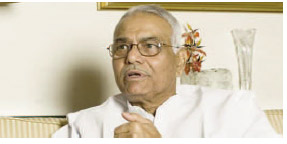 Yashwant Sinha
With the economy
in the midst of
the crucial
second half of
the current
fiscal, there is a
sense of frenetic pace of activities
from the Modi Sarkar, stung by the
criticism of resident dissidents of
stalwart stature such as former
Finance Minister Yashwant Sinha and former Union Minister of Commerce,
Industry and Disinvestment Arun
Shourie.
Yashwant Sinha
With the economy
in the midst of
the crucial
second half of
the current
fiscal, there is a
sense of frenetic pace of activities
from the Modi Sarkar, stung by the
criticism of resident dissidents of
stalwart stature such as former
Finance Minister Yashwant Sinha and former Union Minister of Commerce,
Industry and Disinvestment Arun
Shourie.
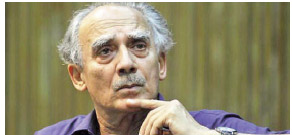 Arun Shourie
Sinha's outpourings manifest in his
onslaught against the inept economic
policies and the concomitant
slowdown of the economy by the
NDA government headed by Prime
Minister Narendra Modi and his man
Friday Finance Minister Arun Jaitley
Arun Shourie
Sinha's outpourings manifest in his
onslaught against the inept economic
policies and the concomitant
slowdown of the economy by the
NDA government headed by Prime
Minister Narendra Modi and his man
Friday Finance Minister Arun Jaitley
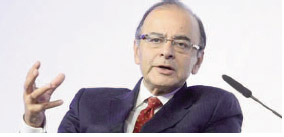 Arun Jaitley
expressed through a newspaper
column made the normally
salubrious month of September and
the one followed by festival seasons
in the country tumultuous with
invidious interchange of points and
counterpoints between not only
biggies within the BJP party and the
ones sidelined but also between the
NDA and the motley number of
scattered Opposition parties who
were able to gather their scattered
wits to highlight the real issues
plaguing the polity on the ground for
once.
Arun Jaitley
expressed through a newspaper
column made the normally
salubrious month of September and
the one followed by festival seasons
in the country tumultuous with
invidious interchange of points and
counterpoints between not only
biggies within the BJP party and the
ones sidelined but also between the
NDA and the motley number of
scattered Opposition parties who
were able to gather their scattered
wits to highlight the real issues
plaguing the polity on the ground for
once.
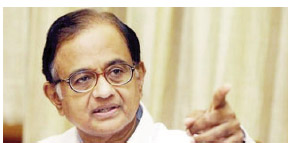 P. Chidambaram
Even as the government fielded
cabinet ministers including Rajnath
Singh Piyush Goyal, Yashwant Sinha's
son Jayant Sinha, BJP President Amit
Shah with the wounded Jaitley
describing Yashwant Sinha's bonfire
of the NDA economic policies as the
frustrated remarks of an
octogenarian's failed bid to get a
place in the government, the nub of
the attack remained irremovable
from discerning minds because of the
transparency and truthful nature of
the charge. It was given to former
finance minister P. Chidambaram to
quip that the BJP and its government could no longer "hide behind the
rhetoric of the prime minister and the
slogans of the party and it is small
mercy we no longer hear the slogan
'acche din aanewale hai".
P. Chidambaram
Even as the government fielded
cabinet ministers including Rajnath
Singh Piyush Goyal, Yashwant Sinha's
son Jayant Sinha, BJP President Amit
Shah with the wounded Jaitley
describing Yashwant Sinha's bonfire
of the NDA economic policies as the
frustrated remarks of an
octogenarian's failed bid to get a
place in the government, the nub of
the attack remained irremovable
from discerning minds because of the
transparency and truthful nature of
the charge. It was given to former
finance minister P. Chidambaram to
quip that the BJP and its government could no longer "hide behind the
rhetoric of the prime minister and the
slogans of the party and it is small
mercy we no longer hear the slogan
'acche din aanewale hai".
Not the one to take criticism lightly,
the Prime Minister responded to his
detractors immediately at a function
organized by the Indian Institute of
Company Secretaries of India (IICS) in
the capital to denounce them as
"people who sleep well only after
spreading pessimism".
Fortunately, the macroeconomic
fundamentals of the economy appear to be
robust now with indices of factory output
during October 2017 showing up a salutary
performance and September inflation
numbers based on the wholesale price
index declining too. The country's exports
during the first half of the current fiscal
too perked up with the prospects for the
full year showing up a good performance
on the back of the World Trade
organization's (WTO) recent revised
positive assessment of global trade growth
for the second half of the year.
While stoutly defending his
government's management of the
economy with a pledge to reverse the
slowdown in the economic growth,
Modi took pride in the fact that India
is no longer part of the so-called
Fragile Five(an allusion to the BRICS
bloc comprising Brazil, Russia, India,
China and South Africa) or countries
that stood to lose the most in 2013
from the US Federal Reserve
indication to withdraw ultra loose
monetary policy that led to taper
tantrum. He recounted the
government's reformist initiatives
since he took over the office which
numbered 87 reforms across 21
sectors and highlighted latest data to
demonstrate the nascent green
shoots in the economy.
Interestingly, the Prime Minister
used the podium to scotch wild
canards that his government will go
all out to hound out companies
joining the formal economy,
particularly through the goods and
services tax (GST) regime. "People
keen to join mainstream (from the
informal economy) fear that their old
records may be reopened. We will not
let that happen because earlier their
old way of business was necessitated
by prevailing circumstances. Nothing
is more sinful than blocking those
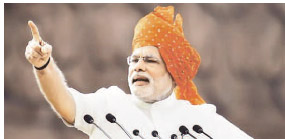 Narendra Modi
who want to come to the
mainstream. Let bygones be
bygones", the Prime Minister
reassured all those apprehensive of
the long arm of the laws.
He further contended that "if any
sector needs temporary assistance,
on account of demonetization or the
advent of GST, the government would
give it, whether it is small and
medium enterprise (SME), exports or
the informal economy".
Narendra Modi
who want to come to the
mainstream. Let bygones be
bygones", the Prime Minister
reassured all those apprehensive of
the long arm of the laws.
He further contended that "if any
sector needs temporary assistance,
on account of demonetization or the
advent of GST, the government would
give it, whether it is small and
medium enterprise (SME), exports or
the informal economy".
Not being defensive alone in
words, Modi immediately followed in
action by ensuring the return of the
Economic Advisory Council (EAC) to
the Prime Minister so that it could
proffer important policy prescriptions
and wise counsels to steer the ship of
the economy in these troubled days
when both internal demand and
external markets for trading our
goods remain tepid, lacking in
traction to benefit by.
As a welcome pre-Diwali gift to
trade and industry, the Goods and
Services Tax (GST) Council, meeting
on October 6, came out with a raft of
decisions which include modification
in the rates of 27 categories of goods
and offer of a clutch of concessions to
small enterprises and exporters .It
needs to be recalled that small
enterprises and exporters were
finding it intractable to cope with the
onerous burden of filing three GST
returns very month and securing
input credits. Those below an annual
turnover limit of 20 lakh of rupees
were finding it arduous to sell to
registered businesses. Since the
latter, as per the principle of 'reverse
charge', would pay the GST, they
would rather transact with a
registered entity.
By keeping 'reverse charge' in
abeyance, the GST Council, prodded
by the Centre under burgeoning
pressure to revive the economy and foster employment, has provided
relief to small enterprises. Similarly,
the increase in the threshold limit of
the 'composition scheme' would
reduce cumbersome compliance
processes. Permitting units below a
turnover of 1.5 crore of rupees to file
quarterly rather than monthly returns
comes as a breather for small units.
Also, service-providers whether interstate
or exporters have been given
relief by making the 20 lakh of rupees
threshold applicable to them. It is not
fair in a digital age to presume that
only large players transact across
borders.
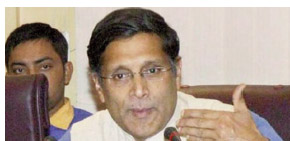 Arvind Subramanian
It must be set in perspective that
according to the Chief Economic
Advisor Dr. Arvind Subramanian's
2015 report on GST, enterprises with
a turnover of less than 10 crore of
rupees account for 18 per cent of the
total sales turnover and 98 per cent of
enterprise assesses, whereas conversely, those above 10 crore of
rupees (and above 100 crore of
rupees) account for 82 per cent of the
sales turnover and just two per cent
of taxpayers. It therefore makes
eminent sense not to slap stifling
norms on a large section of the
assessees if invoice details could be
provided on a half-yearly or annual
basis and summary returns on a
monthly basis to the vast majority of
GST asseseees.
Arvind Subramanian
It must be set in perspective that
according to the Chief Economic
Advisor Dr. Arvind Subramanian's
2015 report on GST, enterprises with
a turnover of less than 10 crore of
rupees account for 18 per cent of the
total sales turnover and 98 per cent of
enterprise assesses, whereas conversely, those above 10 crore of
rupees (and above 100 crore of
rupees) account for 82 per cent of the
sales turnover and just two per cent
of taxpayers. It therefore makes
eminent sense not to slap stifling
norms on a large section of the
assessees if invoice details could be
provided on a half-yearly or annual
basis and summary returns on a
monthly basis to the vast majority of
GST asseseees.
As for rate revision, tax on 27 items
including sliced dried mangoes,
khakra, plain chapattis, unbranded
namkeen, man-made yarn,
stationery, diesel engine parts and
services such as zari job work have
been whittled down to mollify
irascible small industries before the
onset of polls in many States.
Even as the rush to implement the
GST on July 1 has resulted in much
avoidable confusion from the day one with a series of revisions, ambiguity
on many facets still persisting, the
alterations made in mid-course do
point to the fact that the authorities
are not totally insensitive and
stubborn and that they do learn by
mistakes to make the dream of one
India one tax a potential success story
India would be scripting in the
foreseeable future to the marvel of
the world, policy analysts say.
With the Government's freshly
appointed PM EAC admitting the
economic growth slowdown in its first
full meeting chaired by the Prime
Minister, the stark reality to initiate
action and keep the wheels of the real
sectors of the economy moving are
now incumbent upon the Modi
Sarkar.
Fortunately, the macroeconomic
fundamentals of the economy appear
to be robust now with indices of
factory output during October 2017
showing up a salutary performance
and September inflation numbers
based on the wholesale price index
declining too. The country's exports
during the first half of the current
fiscal too perked up with the
prospects for the full year showing up
a good performance on the back of
the World Trade organization's (WTO)
recent revised positive assessment of
global trade growth for the second
half of the year.
The BJP-led NDA government has
its priorities cut out and it has no alibi
for putting up a good performance on
the economy before it seeks a fresh
mandate in 2019 and in between a
few major State Assembly polls
intervening. The party secured a
thumping majority in Parliament in
2014 and more than half of the 26
State governments today are in the
hands of the BJP, a scenario seldom
seen in post- Independence era when
the Congress party dominated the
landscape like a colossus.
It is up to both the national parties
to challenge each other on the terrain
to wrest control in the polls only
through a credible policy plank and
creditable stalwarts to take India to a
pole position in the global economy
before long.




 G.Srinivasan
G.Srinivasan
 Yashwant Sinha
Yashwant Sinha
 Arun Shourie
Arun Shourie
 Arun Jaitley
Arun Jaitley
 P. Chidambaram
P. Chidambaram
 Narendra Modi
Narendra Modi
 Arvind Subramanian
Arvind Subramanian